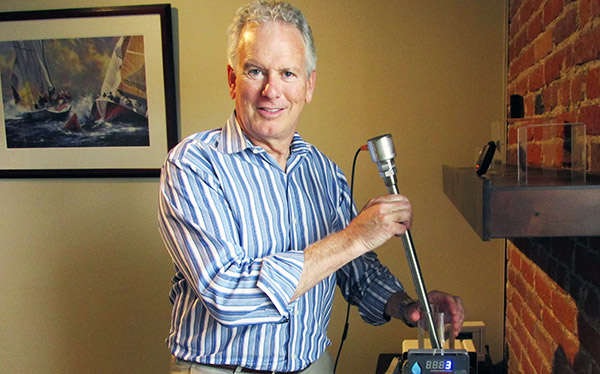Entrepreneur David Armitage thinks there’s no reason to expose workers to dangerous fumes.
His startup Cartasite finished a $7.5 million funding round at the end of June. It will use the money to market a product that eliminates the need to manually measure an oil/gas disposal truck’s levels of waste water from oil and gas extraction, which emits fumes that can harm workers.
“It’s 2017 for God’s sake. They’ve got to be doing better than this,” Armitage said.
The 13-year-old company, based on Denver’s Auraria Campus, is relying on funding from California-based Bison Capital and Kansas City-based Curran Cos.
This is the company’s fourth round of funding, bringing its total of capital raised to $22 million.
“Streamlining business processes, many of which have been in place for 50 years, takes time and money,” Armitage said.
The standard practice of climbing on top of a truck’s 20-foot-tall tank, inserting a stick to measure waste water levels and letting fumes escape is a health and safety issue as well as an environmental one, he said. Methane and toxic volatile organic compounds that vaporize at low temperatures are released five to 10 times a day at each water-collection stop.
“It’s not just slips and falls, it’s the fumes themselves,” Armitage said. “We do not want this stuff flowing up to the atmosphere.”
FieldFLOW is the first technology to digitize the measuring process, so the raised money is going toward creating a new market. Armitage has patents pending on the technology. He estimates there are 550 water-hauling companies that are the target customers for fieldFLOW. The product costs $99 per truck per month.
According to Armitage, the United States produces 9 million barrels of oil a day, resulting in 30 million barrels of waste water that must be transported and disposed of by being pumped back into the ground. He said waste water disposal is a $30 billion-a-year industry.
Armitage, a former oil and gas geologist, founded Cartasite in 2004. He previously started and sold two companies.
Armitage said 50 percent of Cartasite’s revenue comes from a device that collects data on drivers to improve driving behavior, and 30 percent comes from a tracking device placed on equipment.
The company has grown from 25 employees in 2016 to 44 today. Its products are used in 34 countries.
For the past year, Cartasite has been testing fieldFLOW with Lakewood-based Pioneer Energy and Texas-based Newfield Exploration.
“They confirmed there is a market demand for this,” Armitage said.
Entrepreneur David Armitage thinks there’s no reason to expose workers to dangerous fumes.
His startup Cartasite finished a $7.5 million funding round at the end of June. It will use the money to market a product that eliminates the need to manually measure an oil/gas disposal truck’s levels of waste water from oil and gas extraction, which emits fumes that can harm workers.
“It’s 2017 for God’s sake. They’ve got to be doing better than this,” Armitage said.
The 13-year-old company, based on Denver’s Auraria Campus, is relying on funding from California-based Bison Capital and Kansas City-based Curran Cos.
This is the company’s fourth round of funding, bringing its total of capital raised to $22 million.
“Streamlining business processes, many of which have been in place for 50 years, takes time and money,” Armitage said.
The standard practice of climbing on top of a truck’s 20-foot-tall tank, inserting a stick to measure waste water levels and letting fumes escape is a health and safety issue as well as an environmental one, he said. Methane and toxic volatile organic compounds that vaporize at low temperatures are released five to 10 times a day at each water-collection stop.
“It’s not just slips and falls, it’s the fumes themselves,” Armitage said. “We do not want this stuff flowing up to the atmosphere.”
FieldFLOW is the first technology to digitize the measuring process, so the raised money is going toward creating a new market. Armitage has patents pending on the technology. He estimates there are 550 water-hauling companies that are the target customers for fieldFLOW. The product costs $99 per truck per month.
According to Armitage, the United States produces 9 million barrels of oil a day, resulting in 30 million barrels of waste water that must be transported and disposed of by being pumped back into the ground. He said waste water disposal is a $30 billion-a-year industry.
Armitage, a former oil and gas geologist, founded Cartasite in 2004. He previously started and sold two companies.
Armitage said 50 percent of Cartasite’s revenue comes from a device that collects data on drivers to improve driving behavior, and 30 percent comes from a tracking device placed on equipment.
The company has grown from 25 employees in 2016 to 44 today. Its products are used in 34 countries.
For the past year, Cartasite has been testing fieldFLOW with Lakewood-based Pioneer Energy and Texas-based Newfield Exploration.
“They confirmed there is a market demand for this,” Armitage said.


Leave a Reply